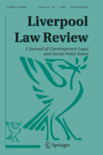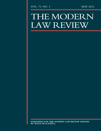
Vox Juris
Scope & Guideline
Exploring the intersections of law and society.
Introduction
Aims and Scopes
- Interdisciplinary Legal Studies:
The journal encompasses a wide range of legal topics, merging insights from law, sociology, psychology, and political science to address complex legal issues. - Focus on Latin American Legal Context:
Vox Juris particularly emphasizes legal developments in Latin America, providing a regional perspective on global legal issues, which is crucial for understanding local legal systems. - Human Rights and Social Justice:
A significant focus is placed on human rights, social justice, and the legal treatment of vulnerable populations, highlighting the journal's commitment to ethical legal practice. - Criminal Law and Justice Studies:
The journal frequently publishes research related to criminal law, including studies on criminal behavior, justice reform, and the intersection of law with crime and societal issues. - Technology and Law:
Emerging themes related to technology's impact on law, including digital rights, cybercrime, and the implications of information technology for legal frameworks, are increasingly prominent in the journal.
Trending and Emerging
- Gender and Law:
There is a growing emphasis on gender-related legal issues, including femicide, women's rights, and the legal implications of gender discrimination, reflecting a broader societal focus on gender equality. - Digital Rights and Cyber Law:
The exploration of digital rights, cybercrime, and the legal implications of technology is on the rise, indicating a shift towards addressing the challenges posed by the digital age. - Restorative Justice and Alternative Legal Mechanisms:
Emerging discussions around restorative justice and alternative dispute resolution mechanisms highlight a trend towards more humane and rehabilitative approaches in the legal system. - Socio-Environmental Law:
Research focusing on the intersection of law with environmental issues and social justice is gaining traction, underscoring the importance of sustainable legal practices in contemporary society. - Public Health Law:
The impact of public health on legal frameworks, particularly in the context of the COVID-19 pandemic, has led to an increase in studies addressing the intersection of health policies and legal rights.
Declining or Waning
- Traditional Legal Doctrines:
The focus on classical legal doctrines and rigid interpretations of law seems to be diminishing, as the journal increasingly embraces more dynamic and interdisciplinary approaches. - Historical Legal Analysis:
Research centered on historical legal analysis has decreased, indicating a shift towards contemporary issues and practical applications of law rather than historical perspectives. - Generalized Comparative Law Studies:
While comparative law remains relevant, there is a noticeable decline in generalized studies that do not focus on specific regional or contextual applications, as the journal seeks to deepen its analysis of localized legal phenomena. - Theoretical Perspectives on Law:
Papers that solely focus on theoretical aspects of law without practical implications are becoming less frequent, as the journal leans towards research that addresses real-world legal challenges and reforms.
Similar Journals

Revista de la Facultad de Derecho
Connecting Researchers and Practitioners in LawRevista de la Facultad de Derecho is an esteemed open-access journal published by the Universidad de la República, Facultad de Derecho, based in Montevideo, Uruguay. Since its inception in 2007, the journal has committed itself to disseminating high-quality legal scholarship, covering a wide range of topics within the field of law. With a dedication to promoting academic dialogue and advancing legal research, the journal serves as a vital resource for researchers, legal professionals, and students alike. The publication aims to foster discussions on contemporary legal issues while providing a platform for interdisciplinary insights. The journal is accessible online through its ISSN 0797-8316 and E-ISSN 2301-0665, ensuring that its content reaches a broad audience across the globe. With a focus on accessibility and scholarly rigor, the Revista de la Facultad de Derecho plays a pivotal role in advancing legal education and research in Latin America.

African Journal of Legal Studies
Fostering Scholarly Dialogue in African Law and SocietyAfrican Journal of Legal Studies, published by BRILL, is a notable platform for scholarly discourse in the fields of law, political science, and sociology, catering to researchers, practitioners, and students interested in the African context. With its ISSN 2210-9730, this journal is committed to presenting in-depth research and commentary on contemporary legal issues and political dynamics across Africa. Although classified in the Q4 quartile rankings in law, political science, and sociology for 2023, its focus on innovative scholarship provides a meaningful contribution to these disciplines. The journal's dedicated efforts in promoting open-access scholarly communication ensure that critical local and regional issues receive the attention they deserve. Operating from the Netherlands, the journal has consistently aimed to bridge gaps in existing literature since its inception in 2004, and remains a vital resource for understanding the intricate relationship between law and society in the African landscape.

Tsinghua China Law Review
Exploring the intersections of Chinese and global law.Tsinghua China Law Review is an esteemed academic journal published by the Tsinghua University School of Law in China, dedicated to advancing the field of law through rigorous scholarly analysis and critical discourse. Established in 2019, this journal has carved a niche for itself within the legal community, striving to cover pertinent issues in Chinese law and its intersections with global legal trends. Although it retains an H-index disclaim and has discontinued its coverage in Scopus after 2024, it continues to provide a platform for innovative research and thought-provoking essays. Recognized for its contributions, it is categorized as Q4 in Law based on the latest ranking, positioning it at a pivotal juncture for emerging scholars aiming to make their mark within the legal scholarship landscape. With open access options limited, Tsinghua China Law Review remains a valuable resource for researchers, professionals, and students eager to engage with contemporary legal issues that shape society in an increasingly interconnected world.

Revista CES Derecho
Fostering Critical Insights in the Heart of Law.Revista CES Derecho is a distinguished academic journal published by UNIV CES, focused on the multifaceted field of law. Situated in Medellin, Colombia, this journal serves as a vital platform for disseminating innovative research and critical analysis in legal studies, encouraging the exchange of ideas among scholars, practitioners, and students alike. With its commitment to open access, the journal provides unfettered access to its content, ensuring that its valuable insights reach a diverse audience. Although specific metrics such as H-Index and Scopus rankings are currently unavailable, the Revista CES Derecho aims to enhance the quality of legal education and practice by fostering scholarly discourse and informing progressive legal thought. Researchers and practitioners are invited to contribute to this dynamic publication, further enriching the discourse in the ever-evolving landscape of law.

Liverpool Law Review
Empowering Legal Minds Through Accessible ScholarshipLiverpool Law Review, published by Springer, is a prestigious open-access journal in the field of law, dedicated to fostering scholarship and promoting dialogue on contemporary legal issues. Since its inception, the journal has evolved significantly, with a publishing history dating back to 1979 and showcasing an extensive range of articles and reviews that contribute to the development of legal theory and practice. The journal is indexed under Scopus, ranking #352 out of 1025 in the Social Sciences category, placing it in the 65th percentile—indicative of its solid reputation and relevance in the field. Liverpool Law Review provides an engaging platform for researchers, professionals, and students alike by facilitating access to high-quality legal research, with full open access available since 2012, ensuring that vital academic discussions are accessible to a global audience. With its commitment to exploring both historical and contemporary issues in law, this journal remains an essential resource for those seeking to deepen their understanding and contribute meaningfully to the legal landscape.

Justicia
Innovating research in law and political science.Justicia, a distinguished academic journal published by UNIV SIMON BOLIVAR, serves as a vital platform for the dissemination of research within the fields of law, political science, and social justice. Since its transition to Open Access in 2014, it has broadened its reach, enabling scholars, practitioners, and students from around the globe to engage with high-quality research unrestricted by subscription barriers. Located in Barranquilla, Colombia, the journal aims to foster interdisciplinary dialogue and innovation by publishing original articles, reviews, and case studies that reflect contemporary legal challenges and social issues. With its commitment to elevating discussions on justice and governance, Justicia plays a crucial role in shaping legal scholarship and influences policy-making, making it an essential resource for anyone dedicated to understanding and contributing to the field.

Cadernos de Dereito Actual
Navigating the complexities of contemporary law.Cadernos de Dereito Actual is a distinguished peer-reviewed journal published by the University of Santiago de Compostela, focusing on contemporary legal studies and current issues within the field of law. With its open access model instituted since 2013, the journal aims to enhance the accessibility of legal research and foster academic dialogue among researchers, professionals, and students globally. Featuring an ISSN of 2340-860X and an E-ISSN of 2386-5229, Cadernos de Dereito Actual is committed to publishing high-quality articles that contribute to the advancement of legal scholarship. Although specific metrics such as the H-index and Scopus rankings are not currently available, the journal remains a pivotal platform for innovative research and insights within the field of law, promoting rigorous academic standards and interdisciplinary approaches. For further information or to submit your research, please contact the publication service at SERVICIO DE PUBLICACIONES E INTERCAMBIO CIENTIFICO, CAMPUS UNIV SUR, SANTIAGO DE COMPOSTELA 15782, SPAIN.

ALBERTA LAW REVIEW
Fostering dialogue on contemporary legal challenges.ALBERTA LAW REVIEW, published by the University of Alberta, stands as a key academic journal in the field of law, contributing to the discourse on legal issues and developments in Canada and beyond. With an ISSN of 0002-4821 and an E-ISSN of 1925-8356, this journal has been pivotal since its inception in 1974, providing a platform for legal scholarship that spans a diverse range of topics, from constitutional law to social justice. Although it operates under a traditional subscription model, the journal's illustrious history and rigorously peer-reviewed content affirm its stature in advancing legal research and education. The Alberta Law Review not only serves as a resource for academics and students, but also offers legal practitioners critical insights and analysis pertinent to contemporary legal challenges. With a commitment to enlightening the discourse around law, it is an invaluable asset for anyone engaged in the legal profession or related fields.

MODERN LAW REVIEW
Elevating Legal Scholarship Since 1937.MODERN LAW REVIEW, a prestigious academic journal published by Wiley, stands as a significant platform in the field of law, dedicated to exploring contemporary legal issues and fostering scholarly discourse since its inception in 1937. With an impressive Scopus Rank of #237 out of 1025 in the Social Sciences - Law category, placing it in the 76th percentile, the journal has consistently maintained a reputation for high-quality research, currently positioned in Q2 of the category quartiles as of 2023. The journal's comprehensive coverage spans various legal topics, making it essential reading for legal scholars, practitioners, and students alike. Although it is not an open-access journal, its contributions are invaluable for guiding the future of legal scholarship. With a robust history of converged years from 1995, 1997 to 1999, 2001 to 2002, 2004, and 2011 to 2024, MODERN LAW REVIEW remains at the forefront of legal research, addressing pressing issues and influencing legal thought across disciplines.

De Jure Law Journal
Advancing Legal Scholarship, One Article at a Time.De Jure Law Journal, published by Pretoria University Law Press, is a reputable open access journal that has been serving the legal community since its establishment in 2011. With its commitment to disseminating high-quality research, this journal focuses on various aspects of law and legal principles, encompassing a broad range of topics from constitutional law to international legal frameworks. The journal's ISSN 1466-3597 and E-ISSN 2225-7160 ensure that it is easily accessible and widely recognized in academic circles. Positioned as a significant contributor to legal scholarship in South Africa and beyond, De Jure Law Journal is dedicated to fostering a critical dialogue among researchers, practitioners, and students alike, making it an essential resource for anyone engaged in legal studies.